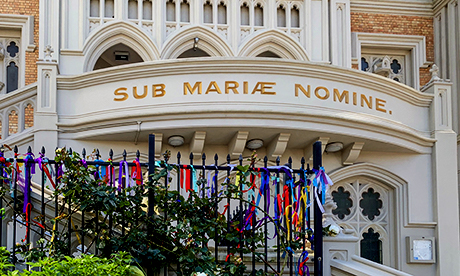A Wellington parish priest changed tack on Sunday, joining his congregation in supporting sex abuse survivors, and tied a ribbon to the church fence.
The move by the parish priest of St Mary of the Angels, Fr Kevin Conroy SM, came after helpful conversations with Liz Tonks, an advocate for survivors of sexual abuse, and a further conversation with Catholic Church media advisor Dame Lyndsay Freer.
Initially, Conroy was uncertain about what the ribbons meant, so he cut them down.
“People dump pamphlets without permission, people put rubbish in our gardens, glass, vomit, whatever. And so we’re forever trying to keep the place looking like it should”, he told Dr Murray Heasley in a covertly recorded conversation.
Heasley is a spokesman for the Network of Survivors in Faith-based Institutions.
Freer told Stuff that the initial removal of the ribbons “does not mean the church is in any way lacking in empathy for the victims of abuse.”
She said Conroy had a think about it and was now happy to see the ribbons reinstated.
Freer said Conroy explained at Mass the significance of the ribbons to parishioners, included a prayer for survivors of sexual abuse, invited parishioners to add to the collection of ribbons and added his own.
The St Mary of the Angels ribbon protest was part of the ‘Loud Fence’ movement which began last year in Australia as a response to the Australian Royal Commission.
In Wellington, the ribbons were placed on the church fence to acknowledge historic sexual abuse of children in the Wellington Diocese, particularly at St Patrick’s Colleges in Silverstream and Wellington City, and at St Bernard’s College in Lower Hutt.
In October, the movement reached Dunedin where sexual abuse survivors tied ribbons to the gates of St Joseph’s Cathedral.
On that occasion, Dunedin Bishop Michael Dooley and others from the city’s Diocese were on hand for the event to offer their support.
Talking to Stuff, an unnamed abuse survivor called the initial ribbon removal ‘an outrage.’
“For the priests to take our ribbons down, rather than – as happened in Dunedin – joining the survivors and their supporters in acknowledgement of what happened and advocating [for] it be addressed … is insulting, devastating and an attempt to silence survivors.”
Sources
Additional reading
News category: New Zealand.




